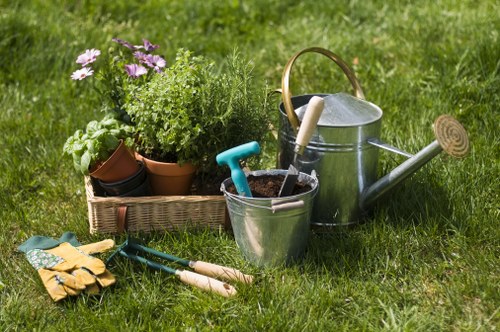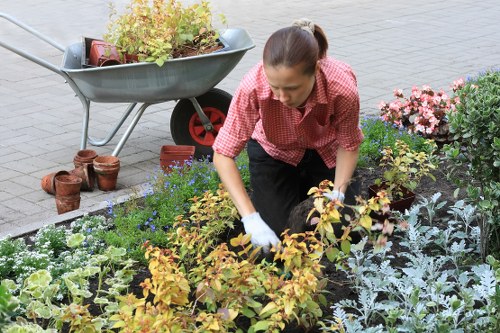Comprehensive Guide to Garden Maintenance in Cleaners SE3
Introduction to Garden Maintenance

Maintaining a beautiful garden in **Cleaners SE3** requires dedication, knowledge, and the right tools. Whether you're a seasoned gardener or a beginner, understanding the essentials of garden maintenance can transform your outdoor space into a vibrant and inviting haven.
Effective garden maintenance not only enhances the aesthetic appeal of your property but also promotes a healthy and sustainable environment. From regular pruning to soil management, each aspect plays a crucial role in the overall health of your garden.
In this article, we'll explore various strategies and tips to help you maintain your garden efficiently in the Cleaners SE3 area, ensuring it remains lush and thriving throughout the year.
Essential Garden Maintenance Tasks

To keep your garden in top condition, it's important to regularly perform a series of maintenance tasks. These tasks can be categorized into seasonal activities, each addressing specific needs of your plants and landscape.
**Spring Maintenance**: As the weather warms up, focus on preparing your garden for the growing season. This includes planting new flowers, fertilizing the soil, and pruning any overgrown shrubs.
**Summer Care**: During the peak growing months, ensure your plants receive adequate water, manage pests, and continue regular weeding to prevent unwanted growth.
Pruning and Trimming

Pruning and trimming are essential for maintaining the shape and health of your plants. Proper pruning encourages new growth, improves air circulation, and reduces the risk of diseases.
When pruning, use sharp and clean tools to make precise cuts. Focus on removing dead or diseased branches, and shape the plant to your desired form. Regular trimming also helps in managing the size of your plants, preventing them from becoming unruly.
**Tip:** Always prune during the appropriate season for each plant to ensure optimal growth and health.
Soil Management

Healthy soil is the foundation of a flourishing garden. Effective soil management involves testing, amending, and maintaining the nutrient levels to support plant growth.
**Soil Testing**: Conduct regular soil tests to determine its pH level and nutrient content. This information helps in making informed decisions about fertilization and soil amendments.
**Adding Organic Matter**: Incorporate compost or well-rotted manure to improve soil structure, enhance moisture retention, and provide essential nutrients to your plants.
Watering and Irrigation

Proper watering is crucial for the health of your garden. Both overwatering and underwatering can lead to plant stress and susceptibility to diseases.
**Irrigation Systems**: Installing an efficient irrigation system can ensure your plants receive consistent moisture. Drip irrigation and soaker hoses are excellent choices for targeted watering.
**Watering Schedule**: Establish a regular watering schedule based on the specific needs of your plants and the local climate. Early morning watering is often recommended to reduce evaporation and fungal growth.
Pest and Disease Control
Managing pests and diseases is a key aspect of garden maintenance. Early detection and intervention can prevent minor issues from escalating into major problems.
**Integrated Pest Management (IPM)**: Utilize IPM techniques, which combine biological, cultural, and chemical methods to control pests in an environmentally friendly manner.
**Natural Remedies**: Encourage beneficial insects like ladybugs and predatory beetles that naturally control pest populations. Additionally, use organic sprays and treatments to manage infestations without harming your plants.
Lawn Care Tips
A well-maintained lawn enhances the overall appeal of your garden. Regular lawn care involves mowing, fertilizing, and addressing any weed or pest issues.
**Mowing**: Keep your lawn at an optimal height to promote healthy grass growth. Avoid cutting more than one-third of the grass blade at a time to prevent stress.
**Fertilization**: Apply appropriate fertilizers to provide the necessary nutrients for your lawn. Tailor your fertilization schedule to the specific grass type and local climate conditions.
Seasonal Landscaping
Adapting your garden's landscaping to the changing seasons ensures year-round beauty and functionality. Each season presents unique opportunities for enhancing your outdoor space.
**Spring Bloomers**: Plant flowers that thrive in spring, such as tulips and daffodils, to add vibrant colors after the winter months.
**Autumn Foliage**: Incorporate trees and shrubs that display stunning autumn colors, creating a picturesque landscape as the leaves change.
Mulching for Health
Mulching is a simple yet effective garden maintenance practice. It involves applying a layer of material on the soil surface to conserve moisture, suppress weeds, and regulate soil temperature.
**Types of Mulch**: Organic mulches like bark, straw, and compost are popular choices. They decompose over time, enriching the soil with nutrients.
**Application**: Spread mulch evenly around your plants, maintaining a depth of 2-3 inches. Avoid piling mulch against plant stems to prevent rot and disease.
Tool Maintenance
Keeping your garden tools in good condition is essential for efficient maintenance. Regular cleaning, sharpening, and proper storage extend the lifespan of your tools and ensure they perform optimally.
**Cleaning**: Remove dirt and debris from tools after each use. Use a wire brush for stubborn residue and dry them thoroughly to prevent rust.
**Sharpening**: Keep blades sharp for precise cuts and reduced effort during gardening tasks. Sharpening also minimizes damage to plants.
Plant Selection and Diversity
Choosing the right plants for your garden is fundamental to successful maintenance. Select plants that are well-suited to the Cleaners SE3 climate and soil conditions.
**Native Plants**: Opt for native species as they are adapted to the local environment, requiring less water and maintenance while supporting local wildlife.
**Diversity**: Incorporate a variety of plants to create a resilient garden ecosystem. Diverse plantings can help reduce pest outbreaks and promote a balanced environment.
Eco-Friendly Practices
Adopting eco-friendly garden maintenance practices benefits both your garden and the environment. Sustainable techniques promote biodiversity and reduce your ecological footprint.
**Composting**: Recycle organic waste through composting, providing natural fertilizer for your plants and reducing landfill waste.
**Rainwater Harvesting**: Collect rainwater to use for irrigation, conserving water resources and lowering your utility bills.
Regular Inspections
Conducting regular inspections of your garden helps identify issues early on. Look for signs of pests, diseases, and nutrient deficiencies to address them promptly.
**Visual Checks**: Examine plants for discoloration, wilting, or abnormal growth patterns, which may indicate underlying problems.
**Soil Monitoring**: Test soil moisture and pH levels regularly to ensure optimal growing conditions for your plants.
Seasonal Cleanup
End-of-season cleanup prepares your garden for the next cycle. Removing dead plants, fallen leaves, and debris prevents the buildup of pests and diseases.
**Winter Preparation**: Protect sensitive plants by adding mulch or covering them to shield against frost and cold temperatures.
**Spring Revival**: Clear out leftover debris to make way for new growth and planting, ensuring a fresh start for the upcoming season.
Professional Garden Maintenance Services
For those seeking expert assistance, professional garden maintenance services in Cleaners SE3 offer comprehensive solutions to keep your garden in pristine condition.
**Customized Plans**: Professionals assess your garden's specific needs and create tailored maintenance plans that align with your goals and budget.
**Expertise and Equipment**: Benefit from the knowledge and specialized equipment that professionals bring, ensuring high-quality care for your garden.
Choosing the Right Garden Maintenance Service
Selecting the appropriate garden maintenance service can significantly impact the health and beauty of your garden. Consider the following factors when making your decision:
- **Experience and Reputation**: Look for established services with positive reviews and a strong track record in Cleaners SE3.
- **Range of Services**: Ensure the service offers the specific maintenance tasks you require, such as pruning, fertilizing, and pest control.
- **Pricing and Contracts**: Compare pricing structures and contract terms to find a service that fits your budget and needs.
DIY vs Professional Maintenance
While DIY garden maintenance can be rewarding and cost-effective, professional services offer expertise and time-saving benefits.
**Advantages of DIY**: Gain hands-on experience, personalize your garden care, and reduce costs by handling tasks yourself.
**Benefits of Professionals**: Access to specialized knowledge, efficient handling of complex tasks, and consistent maintenance schedules ensure your garden remains in top shape.
**Recommendation**: A hybrid approach, combining DIY efforts with periodic professional assistance, can provide the best of both worlds.
Conclusion
Effective **garden maintenance in Cleaners SE3** is key to creating a stunning and sustainable outdoor space. By understanding and implementing essential maintenance tasks, from pruning and soil management to pest control and eco-friendly practices, you can ensure your garden thrives year-round.
Whether you choose to maintain your garden yourself or enlist the help of professional services, the effort invested will pay off with a lush, vibrant garden that enhances your property's beauty and provides a peaceful retreat.
**Contact us today** to learn more about our garden maintenance services and take the first step towards a healthier, more beautiful garden.


